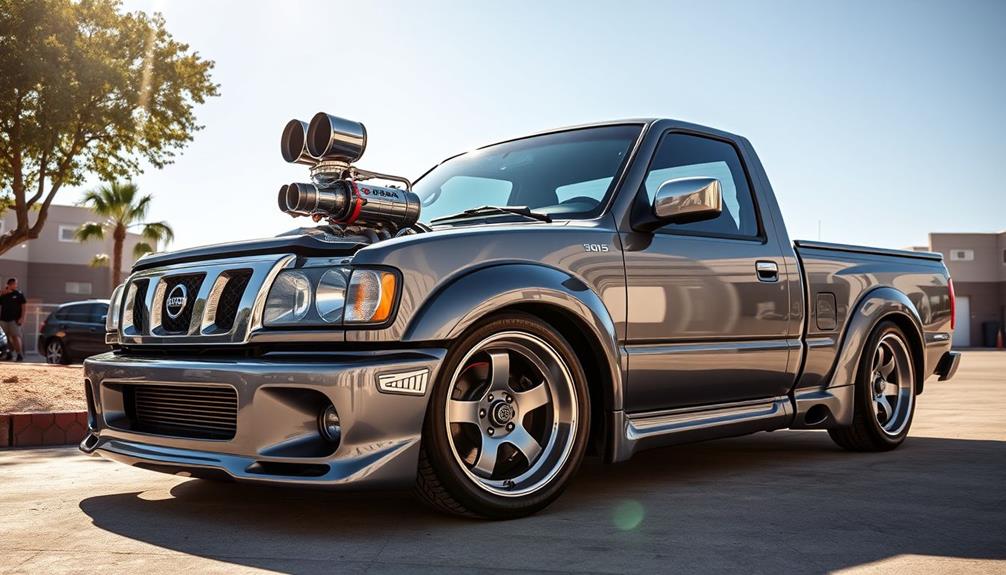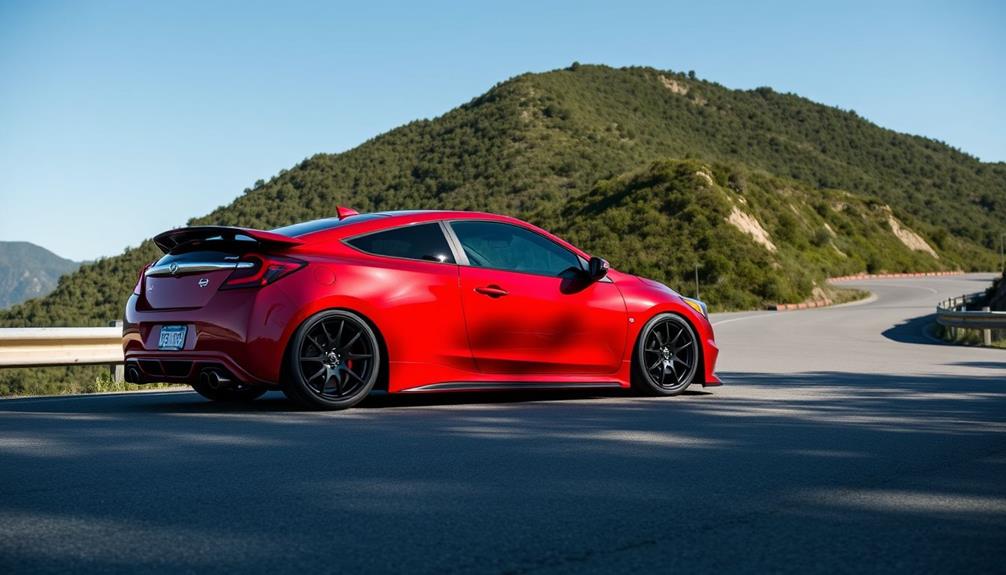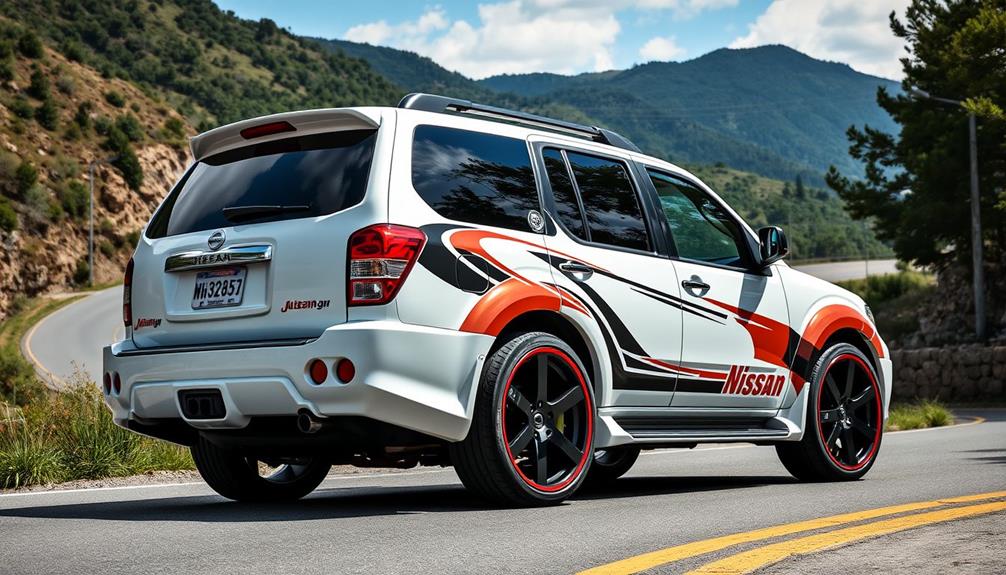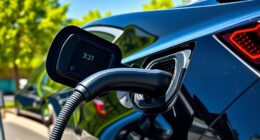Tuning your Nissan Hardbody enhances both performance and style, making your classic pickup truly yours. Start by considering engine swaps like the VG33 for greater power. Upgrading your ignition and exhaust systems can help you reach around 200 HP, while adding performance cams will boost acceleration. For jaw-dropping power, a twin-turbo setup might exceed 700 HP. Don't forget about suspension upgrades for better handling and weight reduction for improved acceleration. With the right modifications, your Hardbody can shine on the road and at shows. There's so much more you can explore to elevate your ride.
Key Takeaways
- Upgrade to performance cams and headers to significantly improve acceleration and overall engine performance in your Nissan Hardbody.
- Consider engine swaps, such as the VG33 or SR engines, for substantial power gains beyond factory specifications.
- Invest in a quality turbocharger and robust cooling system to enhance horsepower and prevent overheating during performance upgrades.
- Lightweight components, like fiberglass parts and lighter wheels, can reduce vehicle mass and improve handling and acceleration.
- Thorough research and community insights are vital for effective tuning and ensuring compatibility of parts and modifications.
Engine Compatibility Overview
When it comes to tuning your Nissan Hardbody, knowing engine compatibility is essential. If you're looking to enhance performance, you'll find that the VG30 engines offer a solid foundation for upgrades. The 1986 Nissan Hardbody's 3.0 V6 can utilize compatible parts from mid-80s 300Z models, which means you've got access to a variety of performance upgrades that can greatly boost your truck's capabilities.
One of the best aspects of the Hardbody is that the SOHC VG30 engines share the same transmission, making swaps easier than you might think. If you're considering a more powerful option, the VG33 engine is nearly a bolt-in choice as well, although you might need to make some wiring modifications.
For those of you aiming for substantial performance improvements, a full engine swap is your best bet rather than trying to modify the existing engine. By upgrading to newer engines or configurations, you can achieve enhanced power and efficiency compared to the original design, which focused more on economy.
Power Enhancement Strategies

To access the true potential of your Nissan Hardbody, you'll want to explore various power enhancement strategies that can transform your truck's performance.
Start by upgrading to performance cams and headers; this can greatly enhance your engine's output, giving you improved acceleration and responsiveness. While tuning options may be somewhat limited, using JWT for ECU flashes can optimize your engine's performance and efficiency, especially when paired with other modifications.
Don't overlook basic enhancements like upgrading your ignition and exhaust systems. These bolt-on modifications can typically yield around 200 HP, maximizing your engine's performance potential.
For even more substantial power increases, consider upgrading to a VG33 engine bored out to 3.8L, which can give you a robust foundation for additional tweaks. If you're really aiming high, a twin-turbo setup can push your power output beyond 700 HP with proper tuning.
Lastly, incorporating side draft carburetors not only enhances power and efficiency but also gives your engine bay that distinctive look reminiscent of a Nissan Pathfinder.
With these strategies, your Hardbody won't only perform better, but it'll still turn heads on the road.
Understanding Performance Limitations

While the Nissan Hardbody offers a solid foundation for performance tuning, it's vital to understand its inherent limitations. The original engines were primarily designed for fuel economy, which restricts their high power output potential without significant modifications. You might achieve around 200 horsepower with some bolt-on upgrades, but reaching 300 horsepower with naturally aspirated VG30 engines often requires a hefty financial investment.
Keep in mind these performance constraints:
- Power Output: Factory specs limit the engine's horsepower, making major upgrades necessary for significant gains.
- Cost of Modifications: Achieving higher horsepower can lead to expensive modifications or engine swaps.
- Competitive Edge: Older Hardbody models often lag behind newer vehicles in acceleration and power-to-weight ratios.
- Upgrade Effectiveness: Simple upgrades may not yield noticeable improvements; extensive modifications or swaps are usually required for substantial gains.
In light of these limitations, it's important to approach your tuning plans with clear expectations and a realistic budget. Understanding these factors will help you make informed decisions as you enhance your classic pickup.
Alternatives for More Power

For those looking to boost the power of their Nissan Hardbody, several engine swap options can deliver impressive performance enhancements. One popular choice is swapping in a KA-E or KA-DE engine, which can greatly elevate 4-cylinder performance compared to the stock engine.
If you're after more displacement, consider the VG33 engine. You can even bore it out to 3.8L, leading to increased power gains.
For those truly aiming for the extreme, implementing a twin turbo setup on a compatible engine could yield over 700 HP, but remember that proper tuning and supporting modifications are essential.
If you want a widely embraced option, the SR engine swap stands out among enthusiasts for its remarkable performance capabilities.
If you're looking for cost-effective ways to enhance power without a full engine swap, don't overlook improved ignition systems and exhaust enhancements.
These modifications can provide noticeable power increases while keeping your budget in check. By considering these alternatives, you can transform your Hardbody into a more powerful and exciting ride, all while enjoying the process of tuning and customizing your classic pickup.
Community Insights and Experiences
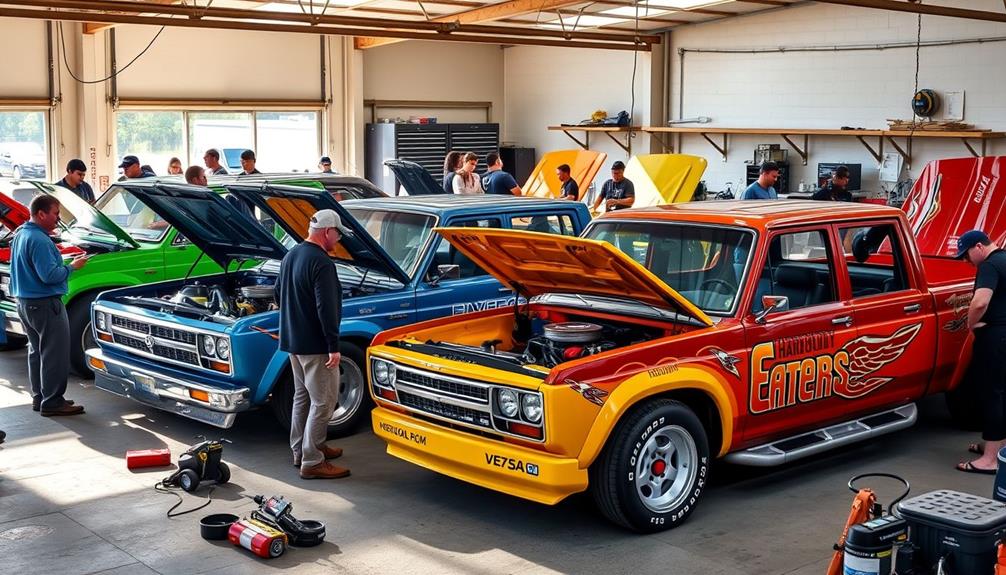
Engaging with the Nissan Hardbody community can significantly enhance your tuning journey. By tapping into the collective knowledge and experiences of fellow enthusiasts, you can make informed decisions that can save time and money.
Many members stress the importance of thorough research before diving into modifications. They share personal experiences—both triumphs and challenges—offering a wealth of lessons for newcomers.
Here are some key insights from the community:
- Prioritize cost-effective modifications like upgrading your ignition system or exhaust components for a performance boost without overspending.
- Understand the trade-off between investment and performance gains, as substantial upgrades don't always translate to proportional horsepower increases.
- Leverage the community's rich knowledge base to discover DIY project tips and part compatibility.
- Engage in discussions that highlight successful engine swaps, providing inspiration and guidance for your own upgrades.
Vehicle Modifications and Upgrades

Vehicle modifications and upgrades can transform your Nissan Hardbody into a personalized powerhouse. Start by retaining the stock automatic differential from a 1995 model while replacing the center chunk. This approach prevents a full rear-end change and minimizes twisting during launches when you install two bars.
For enhanced performance, consider rebuilding your motor with new pistons, an oil pump, a timing chain, and a head gasket. Upgrading the distributor wheel can also make a significant difference, especially when you're running at 23-24 PSI boost levels.
An upgrade to a 240SX intake manifold, combined with modified LS injectors and a 3-bar GM MAP sensor, can vastly improve your tuning. Just make sure to pay attention to the throttle position sensor for ideal idle performance.
If you're installing a Max Speeding Rod turbo, don't overlook cooling; integrating a cooling system and opting for a larger radiator can prevent rapid failures.
Engine Performance Metrics

Understanding engine performance metrics is fundamental for maximizing the potential of your Nissan Hardbody. To achieve peak performance, you should focus on key metrics during tuning and modifications.
Your current setup, boasting 300 horsepower and 370 pounds of torque at 17 PSI, highlights the importance of monitoring these details. With an estimated horsepower of around 400 at higher boost levels, it's important to keep an eye on your engine's critical signs.
Here are some important engine performance metrics to evaluate:
- Idle RPM: Maintain around 20 to guarantee peak performance and avoid tuning issues.
- Boost Levels: Monitor PSI to maximize horsepower without compromising engine integrity.
- Temperature and Pressure Readings: Regular checks can prevent potential performance issues.
- Fuel System Maintenance: Clean fuel injectors and change filters regularly to avoid clogging, especially in high-performance scenarios.
Turbocharger and Cooling Solutions

A well-chosen turbocharger can dramatically enhance your Nissan Hardbody's performance, but it's vital to pair it with an effective cooling solution. Consider installing a Max Speeding Rod turbo to initially boost your engine's power.
However, keep in mind that users have reported quick failures and bearing damage, which highlights the significance of quality components for reliability.
To prevent overheating issues—often linked to inadequate cooling—make certain you also invest in a robust cooling system. An efficient setup can greatly extend your turbo's lifespan and improve overall engine performance.
While some have used a Honda Civic radiator as a temporary fix, upgrading to a more effective cooling system is fundamental for better temperature management.
Watch for signs of smoking or oil restriction, as these could indicate immediate issues with your turbo and its components. Regularly inspect and maintain your system to avoid costly damage.
Additionally, don't overlook the significance of cleaning your fuel injectors and replacing your fuel filter on time. This routine maintenance supports peak turbocharger efficiency and guarantees your Hardbody runs smoothly, allowing you to enjoy the enhanced power you've worked hard to achieve.
Suspension and Weight Reduction

When you focus on suspension and weight reduction for your Nissan Hardbody, you'll notice significant improvements in performance and handling. Optimizing these areas is essential for enhancing your driving experience.
Here's how you can make impactful changes:
- Flat bumpers and fiberglass components: These lightweight materials reduce overall vehicle mass, leading to better performance.
- Upgrade leaf springs and shocks: Maintaining a stock suspension setup while upgrading these components enhances ride quality and handling.
- Lighter wheels: Consider swapping to wheels from a 2005 Toyota 4Runner with Toyo R248 tires. This reduces unsprung weight, improving acceleration and braking.
- Larger radiator: Installing a radiator from a Honda Civic boosts cooling efficiency, especially beneficial if you've upgraded with a turbocharger.
Regularly evaluating and optimizing your suspension components can lead to better handling dynamics.
By implementing these strategies, you not only enhance performance but also bring your classic pickup to a new level of driving enjoyment.
With each modification, you'll feel the difference on the road, making your Nissan Hardbody a truly remarkable vehicle.
Frequently Asked Questions
What Is the Best Year Model for Tuning a Nissan Hardbody?
When considering the best year model for tuning a Nissan Hardbody, many enthusiasts prefer the 1995 edition. It offers a solid platform, reliable performance, and compatibility with various aftermarket parts to enhance your driving experience.
How Much Does a Typical Tuning Project Cost?
Tuning typically takes time and treasure. You'll find costs ranging from a few hundred to several thousand dollars, depending on parts and performance goals. Prioritize your budget to guarantee you achieve your desired results.
Are There Specific Tuning Shops Recommended for Hardbody Modifications?
Sure, you can find reputable tuning shops specializing in Hardbody modifications. Research local businesses, read reviews, and ask fellow enthusiasts for recommendations. It's important to choose a shop with experience and good customer feedback.
Will Tuning Affect My Vehicle's Warranty or Insurance?
Tuning your vehicle can indeed impact your warranty and insurance. Most manufacturers void warranties on modified parts, and insurers might increase premiums or deny claims. It's best to consult them before making any changes.
What Maintenance Is Required After Tuning My Hardbody?
After tuning, think of your vehicle like a finely-tuned instrument; regular oil changes, air filter replacements, and checking spark plugs keep it in harmony. Stay on top of maintenance, and your ride will perform beautifully.
Conclusion
In your journey to enhance your Nissan Hardbody, remember that every modification brings you closer to a ride that reflects your style and passion. You might worry that tuning is too complex or costly, but the joy of driving a customized pickup, uniquely yours, far outweighs the challenges. Embrace the process, connect with fellow enthusiasts, and watch as your classic pickup transforms into a powerhouse of performance and personality. Your Hardbody deserves nothing less!
